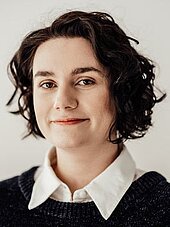Beckmann, Marie
Dissertation topic:
" Patterns of the Posthuman: Negotiating Community in Ancient Greek Tragedy and post-45 U.S. American Literatures." (Working Title)
Doctoral scholarship of the Evangelisches Studienwerk Villigst (1/5/2025 - 30/04/2028).
Contact address at the University of Würzburg:
Chair of American English and American Literature and Culture
Am Hubland
97074 Würzburg
First supervisor: Prof. Dr MaryAnn Snyder-Körber
Second supervisors:
Class in the Graduate School: "Environmental Humanities"
Doctorate in the Graduate School from WS 2024/25.
Abstract:
My dissertation intends to explore negotiations of community based on the discussion of the challenges trauma and disability constitute in cultural productions at two different points in time: the beginning of democracy, in Ancient Greek tragedies, and its current critical state-which some describe as democracy in crisis-, in post-45 U.S. American literatures. Using trauma and disability as examples of challenges communities face and negotiate, I will analyse how they are explored through posthuman patterns, namely the animal, the zombie, and the alien. The focus of my project lies on the function and workings of these patterns in discussing dehumanization, marginalization, alienation and their effects on the individual and community.My project proposes an alternative to reception-based models of analyzing literature by developing the concept of weaving, which I define as creating a pattern-based dialogue between different texts and exploring how these patterns-in this case the animal, alien, and zombie-workto negotiate questions of community in literatures of the past and present. Instead of evaluating representations of trauma and disability, my thesis centres on the complex relation between processes of dehumanization, alienation, and marginalization and their entanglement with trauma and disability that are discussed through the animal, zombie, and alien patterns in my corpus texts. Therefore, my approach departs from established models of trauma and disability studies and reapproaches them through analytical tools of literary and cultural studies.






